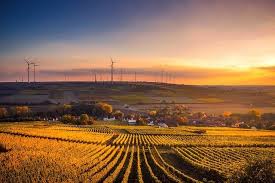
Wind turbines and photovoltaic systems together fed 39.3 terawatt (TW) hours of electricity into the power grid from June to August, around 10 percent more than in the summer months of 2018, the Fraunhofer ISE announced.
"Power generation in the last three months has been very exciting: gas prices and electricity prices on the exchanges have been low and CO2 certificate prices have been high," said Bruno Burger from the Fraunhofer Institute.
The ISE found that the volume of lignite-fired electricity fed into the German public grid was at around 21.6 TW hours this summer, over one-third lower than in the previous year.
At eight TW hours, coal-fired electricity was as much as 50 percent below the figure for summer 2018 while electricity generation from gas, in contrast, rose by almost 50 percent.
As a result, lignite and hard coal-fired power plants were forced out of the German electricity market and the export surpluses of electricity declined, said ISE.
There was also a strong increase in solar energy in June and for the first time, photovoltaics was the strongest source of energy in a single month, the ISE noted.
From June to August, solar power generation totaled 19.3 TW hours, around four percent more than in 2018.
Meanwhile, wind turbines supplied almost 20 TW hours of electricity during this period, some 20 percent increase in wind energy, the Fraunhofer ISE noted.
According to the think tank Agora, the increase in German solar power generation was a consequence of the construction of new solar power plants in the first half of 2019 with an output of 2 gigawatts (GW).
"Solar power is now not only one of the cheapest ways of generating electricity, it is also absolutely necessary to create the energy revolution in Germany and to combat the climate crisis," said Patrick Graichen, executive director at Agora.
The expansion cap of 52 gigawatts needed to be removed as quickly as possible as the mark "could already be reached next year and the expansion would abruptly come to a halt," warned Graichen.
There had already been major problems with the expansion of wind power as only 35 new wind turbines were added across Germany in the first half of 2019, the lowest since 2000, according to the German Wind Energy Association (BWE).